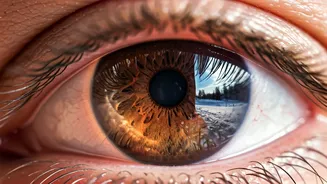Hydrate and Moisturize
Winter's cold, dry air, coupled with indoor heating, can severely impact the moisture levels in your eyes. This dryness leads to discomfort, redness, and
a gritty feeling. To combat this, consciously make an effort to keep your eyes hydrated. This means drinking plenty of water throughout the day. Consider using artificial tears, which are readily available over the counter, to supplement your natural tear production. Applying lubricating eye drops several times a day can relieve dryness and prevent further irritation. Additionally, using a humidifier in your home or office helps add moisture to the air, which indirectly benefits your eyes. Consistent hydration and lubrication are crucial during this season to maintain optimal eye health and comfort.
Shield Against Pollutants
The winter season often sees a rise in air pollution, which is detrimental to eye health. Tiny particles and irritants in the air can cause irritation, redness, and even long-term damage. The most effective way to protect your eyes from these pollutants is to wear protective eyewear. Sunglasses are not just for the summer; they protect against UV rays all year round. They also provide a physical barrier against dust and other particles. When outdoors, especially in areas with high pollution levels, wearing glasses or sunglasses creates a shield. Avoid excessive exposure to smoke and other irritants. If you work in an environment with potential irritants, ensure proper ventilation and consider protective eyewear. This proactive approach ensures your eyes remain protected from the environmental hazards.
Prioritize Hygiene Practices
Maintaining good hygiene is paramount to prevent eye infections and irritations, especially during times when airborne contaminants are prevalent. Avoid touching or rubbing your eyes unnecessarily, as this can transfer bacteria and germs from your hands. Wash your hands frequently with soap and water, especially before touching your eyes, face, or contact lenses. If you wear contact lenses, ensure you follow your eye doctor's cleaning and care instructions meticulously. Replace contact lens cases regularly to prevent bacterial buildup. Make sure that makeup is not shared. Replace eye makeup regularly, as it can harbor bacteria. Implementing these simple hygiene practices significantly reduces the risk of eye infections and ensures the long-term health and wellness of your eyes. These hygiene practices are essential for keeping your eyes healthy.






















